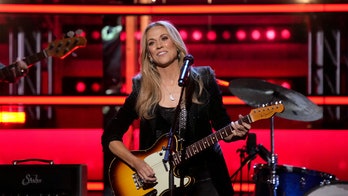New Carl’s Jr. bikini model Kara Del Toro
In the Zone: Del Toro says ‘curvy models’ like Kate Upton make ‘good businesswomen’
Carl’s Jr. made headlines this week for a controversial commercial titled “Borderball” promoting a new Tex Mex burger.
In the spot, scantily clad blonde models on team “Tex” take on scantily clad brunette models on team “Mex” in a game of volleyball over a fence suggesting the Mexico/U.S. border.
The setup had some questioning if the chain restaurant had gone too far flirting with the controversy over immigration policy.
Model Kara Del Toro, on "Team Mex" in the commercial, said she thought it was great the burger chain was addressing the situation, telling FOX411: “I don’t think it goes too far. I think it’s really sexy, and I think it’s playing up on what’s going on politically right now with immigration. I think it was a bold move for Carl’s Jr.”
But a rep for CKE Restaurants – the company who owns Carl’s Jr. – claimed in a statement that wasn’t the company's intention.
“Our new ad for the Tex Mex Bacon Thickburger is not a political statement," the rep said. "It is simply a fast food ad, and, like all of our ads, the premise helps to paint a picture about the food. If a connection was made between the ad and politics – it was certainly not our intent.”
The rep also said the ad was in keeping with its years-old marketing strategy using nearly naked models and celebrities like Kate Upton and Kim Kardashian to sell its sandwiches.
“The best way to judge whether sex sells is to look at actual sales results, which are the ultimate measure of any advertisement's success,” the rep said. “For example, sales of the Carl's Jr. All-Natural Burger reached a new high the week of the Super Bowl broadcast of our “Au Naturale” ad starring Charlotte McKinney.”
The McKinney Super Bowl ad was particularly successful, according to CKE.
“Media coverage of the ad has surpassed 4.5 billion earned media impressions worldwide and the ad has been viewed over 12 million times on our YouTube channel to date, the latter two achievements shattering records for any ad we've ever produced. Even more importantly, the premier consumer-tracking service in our industry, Sandelman, informed us that many of our image- and food-related attribute ratings had experienced significant increases post-Super Bowl versus pre-Super Bowl, and that was completely unsolicited by us. They simply noted it in their data and contacted us.”
Those numbers are not yet available for the controversial “Borderball” spot.
While the restaurant stands by its ads, some brand consultants say there could be a possible disconnect between the brick and mortar stores and the commercials.
“If you look at the actual restaurant and the friendly images in the store itself it seems more family oriented but the ads seem more like you’re walking into Hooters. The person behind counter probably won’t match the model in the commercial. If consumers were rational they would only buy the product if the product was good,” said Alfredo Fraile, the Managing Director Americas for Saffron Brand Consultants. “The brand is a promise you make.”
Yet, the burger chain pointed out that though families may enjoy their food, their demographic is aimed at “young, hungry boys between the ages of 18-34,” who are “very interested in this style of advertising.”
“Sex has and always will sell,” said Alex Friedman President of Ruckus Marketing. “The voices of people objecting to this kind of advertising are getting louder due to social media. People are paying attention to it which is making an impact.”
The CKE rep noted that while Carl’s Jr. is heavily associated with barely dressed women, it is not necessarily their bread and butter.
“This isn’t the only kind of advertising we do. It’s the sexier ads that people remember, talk about and have become iconic."







